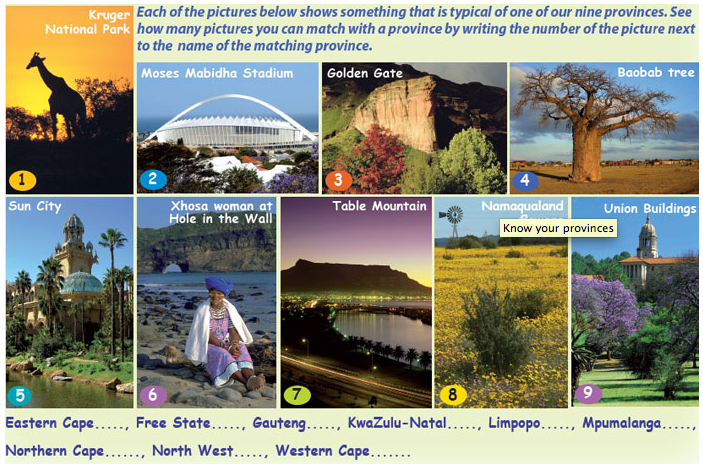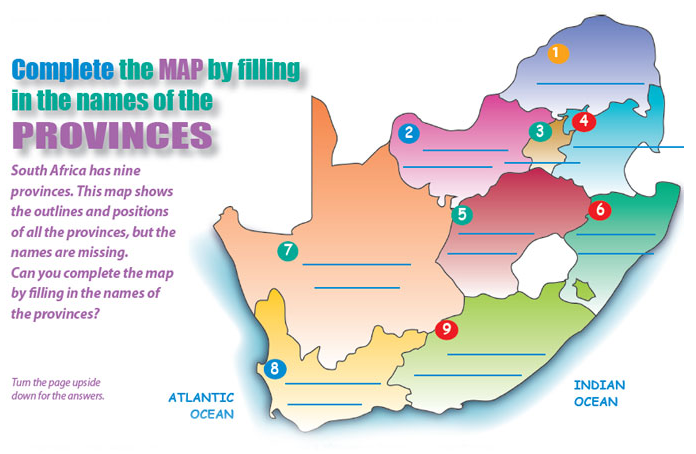Jan/Feb 2011
Jan/Feb 2011 sadmin16 Days of Activism New HOMES bring tears of JOY
16 Days of Activism New HOMES bring tears of JOY sadmin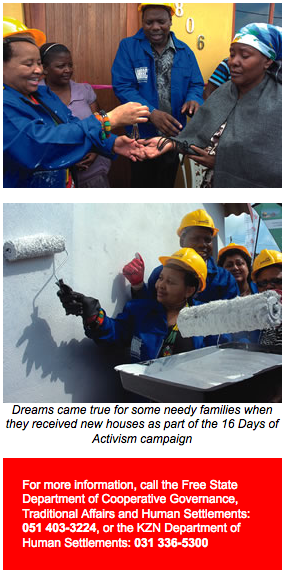 The 16 Days of Activism for No Violence Against Women and Children campaign brought tears of joy to the community of Warden in the Free State. Dreams came true when ten houses were handed over to child-headed families, the disabled and others who had been living here in poverty. Similar projects are also in progress in other parts of the country.
The 16 Days of Activism for No Violence Against Women and Children campaign brought tears of joy to the community of Warden in the Free State. Dreams came true when ten houses were handed over to child-headed families, the disabled and others who had been living here in poverty. Similar projects are also in progress in other parts of the country.
As the 16 Days campaign drew to a close in December last year, the families had reason to celebrate as they received their own houses.
The houses were officially handed over to the families by MEC for Cooperative Governance, Traditional Affairs and Human Settlements,
Mosebenzi Zwane.
Reason to smile
Thirty-year old Nesta Mosia, whois unemployed, was one of the recipients of a new house. She takes care of her four siblings and her
child. The family survives on the social grants of her four siblings and previously lived in a one-bedroom house inherited from their parents, who have since died.
Twenty-two year old Mannini Makgalemele also had a reason to smile after she was handed the keys to a new home. As head of the household, Mannini cares for her two teenage siblings and her three-year old child. The family has been struggling to survive after their grandmother died in 2008 and her pension grant, which had supported the family, was stopped.
In memory
Another would-be recipient was 86-year old Mme Mthembu. She lived in a one-room shack and was looking forward to moving into her own house with her two children, five grand children and three great grand children. Sadly, she never had a chance to do so, as she passed away while the home was being built. But her children will now take ownership of the house in her memory.
Food parcels
Similar projects are in progress in Hobhouse and QwaQwa where homes for other needy families are being built.
Apart from receiving houses, needy families also received food parcels as part of government’s programme to ease poverty.
KwaZulu-Natal
As part of the 16 Days of Activism campaign, houses were also handed over to needy families in KwaZulu-Natal.
Among them was a family fromShongweni, who had been living in poverty and fell victim to a vicious crime last year. A poor family from St Wendolins who still suffer the consequences of a violent murder in the family, also received a house.
– Samona Murugan
17th World Festival of Youth and Students Youth uniting for peace, freedom and social transformation
17th World Festival of Youth and Students Youth uniting for peace, freedom and social transformation sadmin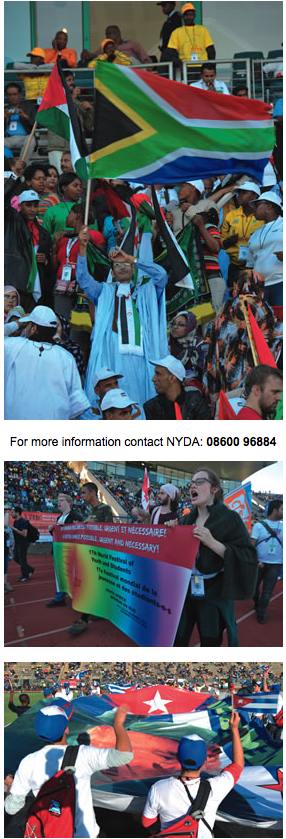 The 17th World Festival of Youth and Students came to a colourful end on 21 December last year when 15 000 youths and delegates
The 17th World Festival of Youth and Students came to a colourful end on 21 December last year when 15 000 youths and delegates
from more than 130 countries gathered at the Union Buildings in Pretoria. It was the first time in the 65-year history of the international youth conference that it was held in southern Africa, and that the conference had a specific focus on issues relevant to youth from the African continent.
The objective of the youth festival is to unite the youth of the world under the banner of promoting the universal principles of peace, freedom and social transformation.
Largest turnout
The festival is organised every four years by the World Federation of Democratic Youth in one of its 153 member states.
With 18 500 delegates from more than 130 countries attending the festival, it was the largest turnout in the past 65 years.
“Young people have a responsibility towards the future; securing it now will ensure that our country and the rest of the world become a far better place than they currently are.”
– Collins Chabane, Minister in the Presidency
Challenges
At the closing ceremony Minister Collins Chabane, Minister in the
Presidency, said discussions during the festival highlighted the different needs and challenges faced by young people from across the world, especially Africa.
The South African government had taken note of these, he said. “Through greater collaboration, and working through multilateral forums, government will ensure that policies are in place to address education, skills development, access to justice, the fight against xenophobia and other forms of oppression,” he said.
– Samona Murugan
Census 2011 Getting READY to be COUNTED
Census 2011 Getting READY to be COUNTED sadmin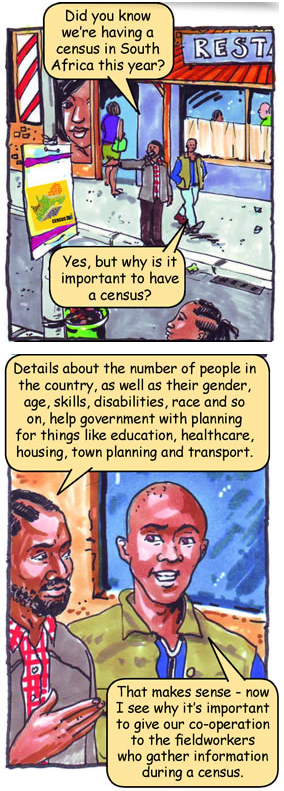 On 9 and 10 October this year, all people who find themselves inside South Africa’s borders will be counted as part of Census 2011. More than 140 000 enumerators (fieldworkers) will be visiting members of the public to gather information.
On 9 and 10 October this year, all people who find themselves inside South Africa’s borders will be counted as part of Census 2011. More than 140 000 enumerators (fieldworkers) will be visiting members of the public to gather information.
Census 2011 fieldworkers will be carrying three different questionnaires when they visit places such as townships, suburbs,
villages, rural homesteads, flats and houses on the nights of the
census.
Members of the public are urged to give their co-operation to census fieldworkers on these two nights.
First questionnaire
The main questionnaire is for households. This questionnaire will be asking questions relating to personal details such as how many people live in a household, their level of education, source of income, state of health, and whether they are employed or not.
Second questionnaire
The second questionnaire is for people who are in the process of travelling from one place to another or on their way to leave the country on the two nights of the census.
These include passengers at airports and various other ports of entry such as harbours and land border posts.
These also include tourists in hotels, people in caravan parks, and homeless people in the streets, as well as those who are travelling on the roads like truck drivers at various truck stops along their routes.
Third questionnaire
The third questionnaire is aimed at people who are in places like hospitals and prisons, as well as for students in residences, boarding
schools, and soldiers in defence force barracks.
It also includes people in police cells, shelters for the homeless, frail care centres, refugee shelters, initiation schools, monasteries, orphanages, homes for the disabled and old-age homes.
It will also be used to record details of babies born before midnight between 9 and 10 October.
– Mbulelo Baloyi
Safety measures
Safety measures have been put in place to ensure the safety of both the enumerators and the public. The 120 000 enumerators will be monitored by 30 000 supervisors, who will also report to higher management.
The public will be able to phone a central database centre to make sure the enumerators are genuine fieldworkers and not criminals posing as fieldworkers. Each enumerator will be a member of the community they serve and will be allocated a total of 120 households in a specific area. This will make it easy to trace them.
Members of the public will be able to identify Census fieldworkers by marked yellow clothing, bibs and identity cards with photographs.
Faces of government 2010
Faces of government 2010 sadminGet to know the faces of government. We introduce you to the president, the deputy president, cabinet ministers, the deputy ministers and premiers of 2010
Focus on the provinces: Free State Baking their daily bread
Focus on the provinces: Free State Baking their daily bread sadmin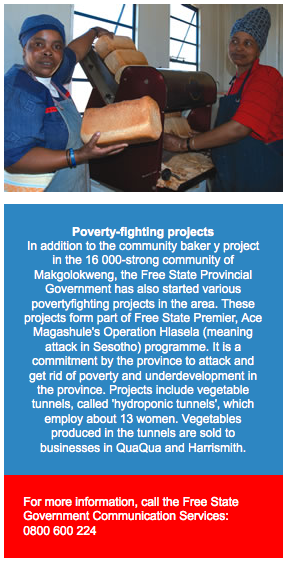 For a group of women from the Makgolokweng area in QwaQwa, the shortage of employment opportunities in the area has not prevented them from putting bread on the table for their families. They rolled up their sleeves and started baking their daily bread.
For a group of women from the Makgolokweng area in QwaQwa, the shortage of employment opportunities in the area has not prevented them from putting bread on the table for their families. They rolled up their sleeves and started baking their daily bread.
Job opportunities in the rural areas of the eastern Free State are very scarce. Most people have farming-related jobs. The few manufacturing companies in the area are in the textile industry, but even in this sector, many people have lost their jobs in recent years.
Co-operative
For a group of women, the famous Chinese saying "Give a man a fish and he'll eat for a day, teach a man to fish and he'll eat for a lifetime" has rung true as they decided to make a plan to put food on the table for their families.
About four years ago, the group of 15 women and some men formed a co-operative called Kholokoe Community Bakery.
"In the beginning, we had teething problems like any new business, but we soon overcame them," says Kholokoe Community Bakery spokesperson, Ida Msimang.
Nutrition Programme
Msimang explains that the community bakery started from a small customer base, but expanded during the last four years. In the beginning they were supplying schools with bread as part of government's National Primary School Nutrition Programme, known as the School Feeding Scheme.
They now supply bread and buns to schools in the Thabo Mofutsanyana District Municipality, which includes the towns of Fouriesburg, Clarens, Harrismith, Kestell and Bethlehem.
Using one baking machine and two ovens, they bake 600 brown loaves every day. Their customers also include a local prison and a hospital.
Supporting our families
Msimang said because of the limited baking equipment, they have not been able to meet the demand for their products. In the meantime, they have approached the National Development Agency (NDA) and asked for extra funding to buy another baking machine.
"At least, we are now able to support our families thanks to this bakery. We start work at six o'clock in the morning and work until late in the evening," she said.
Some of the men are responsible for delivering the bread to their customers, while the others provide security at the bakery premises.
– Mbulelo Baloyi
Focus on the provinces: Limpopo The right to read and write
Focus on the provinces: Limpopo The right to read and write sadmin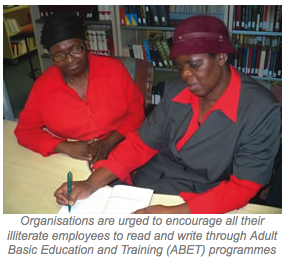 For 59-year old Lizzy Mathebula it has been a life-long dream to read and write, but her family could never afford to send her to school. Lizzy has finally managed to fulfil her dream, thanks to the Education Department's Kha ri Gude mass literacy programme
For 59-year old Lizzy Mathebula it has been a life-long dream to read and write, but her family could never afford to send her to school. Lizzy has finally managed to fulfil her dream, thanks to the Education Department's Kha ri Gude mass literacy programme
When Lizzy heard about the Kha ri Gude literacy programme, she registered without thinking twice. The programme, which means 'Let us learn' in Tshivenda, taught Lizzy and 16 other adults, who never went to school, to read, write and do basic maths. Classes were offered at the Mugidi Primary School in Acornhoek, Limpopo. The programme is offered in all provinces in areas where there is a need.
Reading her Bible
Lizzy made good progress and after attending classes for only a few months, she could read quite well. "I can read my Shangaan Bible without hiccups and soon I will be able to read the English version too," she said.
Another eager student, Dickson Mnisi, who is 67 and a security guard at the school, says he loves attending the classes. "When I'm on night shift, I always make sure I catch up with what they learned during the day," he said. "I would recommend this to all people who cannot read or count, because once you learn how to do it you don't have to rely on strangers to help you with things like withdrawing your money at banks."
Dickson is also excited because instead of signing his name with an X, he can now write his full name.
Empowered
The programme has called upon young people with post-graduate qualifications to volunteer as teachers. Hearing this, Nkateko Fortunate grabbed the opportunity to use her teaching skills for a good cause. "The students are so willing to learn. There is nothing better than seeing them become independent when they can read and write."
– Samona Murugan and BuaNews
Never too late to learn The Limpopo
Department of Agriculture has embarked on a drive to encourage all its illiterate employees to read and write, through its Adult Basic Education and Training (ABET) programme.
There are more than 200 qualifying employees who are already registered for ABET programmes. Many of them can now sign their names instead of making crosses, and some can read forms that are written in English. Students who complete the programme through to level 4, which is equivalent to the National Qualifications Framework's (NQF) level 1 or Grade 9, qualify to enrol at FET colleges for certificate or diploma programmes. In 2010, 34 people received their level 4 certificates.
Mosala Molomo said the ABET initiative had changed his life from nothing to something. He joined the department in 1993 as a general worker and worked as an office assistant. He then completed his ABET level 4. In 2008, he enrolled for an IT technician course and received his NQF level 4 national certificate last year. He is now an IT technician in the department's head office.
"It is really never too late to learn and I am not going to stop improving myself," he said.
Focus on the provinces: Limpopo Water out of thin air
Focus on the provinces: Limpopo Water out of thin air sadmin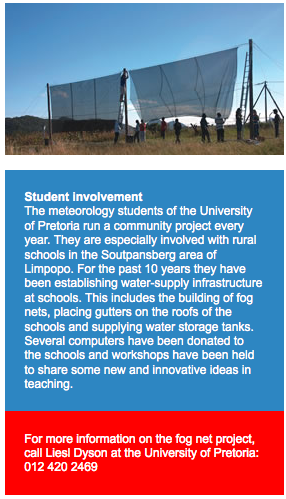 Learners and teachers at the Tshiavha Primary School in Limpopo have not let a shortage of water supply affect their day-to-day learning activities. With help from the University of Pretoria's Department of Geography, Geoinformatics and Meteorology, the school has combined science with nature and created its own water supply out of fog. The project has not only helped the school, but also benefits the entire community.
Learners and teachers at the Tshiavha Primary School in Limpopo have not let a shortage of water supply affect their day-to-day learning activities. With help from the University of Pretoria's Department of Geography, Geoinformatics and Meteorology, the school has combined science with nature and created its own water supply out of fog. The project has not only helped the school, but also benefits the entire community.
Several schools and communities in Limpopo have limited access to water. This affects the health of thousands of people in the province. In an effort to ease this problem, the second-year meteorology students at the University of Pretoria started a project, which traps water from fog.
The Tshiavha Primary School is situated in a mountainous area, which attracts a lot of fog. There is no formal water supply in the area and residents have been highly dependent on water tankers to supply water to the community.
Drinking water
The fog net project has set up threemetre high nets around the school to capture water. The nets consist of three wooden poles, which are nine metres apart. Steel cables stretch horizontally between the poles, over which a double layer of 30 per cent shade-cloth is draped. A gutter runs along the bottom of the shade cloth to channel the water into a storage tank.
The school's fog net traps around 2 500 litres of water per day which is more than enough for the learners to drink. To increase the water supply, the fog net project from the University of Pretoria has also placed gutters on the school's roof to trap even more water.
Garden
Before the fog net was installed, the school had serious problems caused by lack of clean water. Learners and villagers had to use water from a nearby river. This was very unhealthy since the water is polluted and can spread waterborne diseases. The school also started a garden that is irrigated with fog-harvested water and the the community is being trained to look after the nets.
A number of other sites where more nets can be installed to trap water have been identified. The Department of Water and Environmental Affairs has pledged to support the initiative at all suitable sites.
Other communities
Neighbouring communities have also jumped onto the science wagon and have asked for assistance to install nets in their areas to trap water.
– Samona Murugan
Focus on the provinces: Mpumalanga War on poverty: receiving the gift of clean water
Focus on the provinces: Mpumalanga War on poverty: receiving the gift of clean water sadmin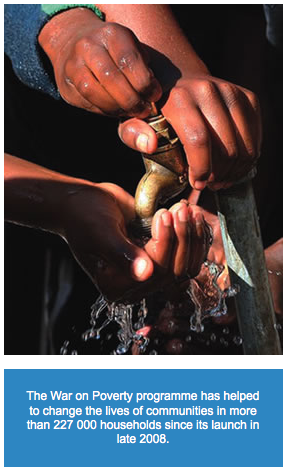 For the people of Ntunda Village in the Nkomazi Municipality, Christmas came early last year when they received the gift of clean running water. Reaping the benefits of improved service delivery in the poorest communities, is what government's War on Poverty programme is all about.
For the people of Ntunda Village in the Nkomazi Municipality, Christmas came early last year when they received the gift of clean running water. Reaping the benefits of improved service delivery in the poorest communities, is what government's War on Poverty programme is all about.
The War on Poverty programme aims to improve the quality of life in the most needy communities by providing a variety of much-needed government services. A new water reservoir has greatly improved conditions in Ntunda Village outside Malelane in Mpumalanga.
Commitment
The reservoir was opened in late October 2010, when Deputy President Kgalema Motlanthe visited the village. The visit showed government's commitment to reach people who have no or limited access to most of its services and programmes.
Ward 17 of Nkomazi Local Municipality was identified with 17 other wards in Mpumalanga as the most needy of basic government services. These include clean water, schools and clinics, as well as access to identity documents, social grants, health services, education opportunities and adult literacy programmes.
Partnerships
The Department of Social Development has registered many people in the area to receive grants. These include child-support grants, disability, foster care and old-age grants. The visit also strengthened partnerships with non-governmental and religious organisations. Such partnerships are aimed at speeding up povertyfighting programmes.
The Deputy President’s visit was part of government’s programme to monitor progress made in the War on Poverty.
The visit also helped the Deputy President to identify further challenges with service delivery in the ward.
Other provinces
Apart from progress made in Mpumalanga, the War on Poverty programme has also been successfully started in other provinces throughout the country. It has helped to change the lives of communities in more than 227 000 households since its launch in late 2008.
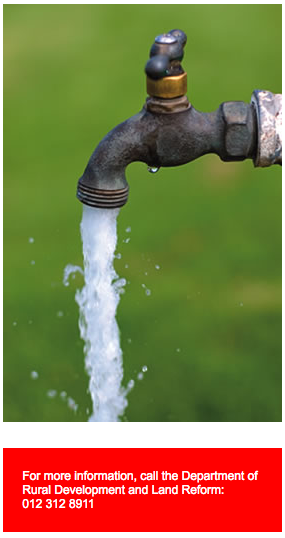 Communities that have benefited include, among others, Jacobsdal in the Free State, Bitou Municipality in the Western Cape and Lubala Village in the Eastern Cape, as well as communities in Limpopo.
Communities that have benefited include, among others, Jacobsdal in the Free State, Bitou Municipality in the Western Cape and Lubala Village in the Eastern Cape, as well as communities in Limpopo.
Free basic services supplied to these communities include water tanks, vegetable tunnels, school uniforms and employment opportunities through programmes which form part of government's Expanded Public Works Programme.
– Mbulelo Baloyi
Focus on the provinces: North West Service delivery on the road to recovery
Focus on the provinces: North West Service delivery on the road to recovery sadmin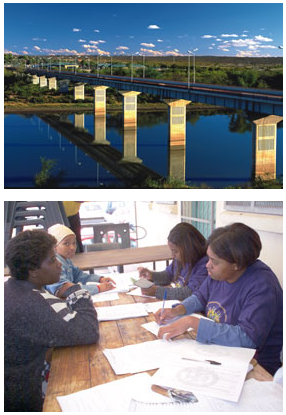 In an effort to improve service delivery, the Local Government and Traditional Affairs Department in the North West province has started various programmes in different municipalities in the province. The programmes are part of the Municipal Turnaround Strategy, which helps solve problems affecting service delivery at local government level.
In an effort to improve service delivery, the Local Government and Traditional Affairs Department in the North West province has started various programmes in different municipalities in the province. The programmes are part of the Municipal Turnaround Strategy, which helps solve problems affecting service delivery at local government level.
Service delivery in the North West province is on the road to recovery thanks to government's Local Government Turnaround Strategy. Programmes in the province include the development of a correct and reliable list of all people who use and receive municipal services such as water, electricity and waste removal. A culture of paying municipal bills will also be promoted.
Credit and debt control
In addition, there are programmes in place to help ensure that the creditcontrol and debt-collection departments of the affected municipalities work efficiently.
A system to ensure that there is a correct and reliable way of reading water and electricity meters, will also be set up. Furthermore, a correct and reliable register of households that cannot afford to pay for municipal services will also be developed. This will give affected municipalities an idea of how many households within their areas will have to be exempted from paying for services such as water, electricity and waste removal.
Billing systems
Currently, five municipalities in the North West stand to benefit from the payment and debt-collection project for a period of six months. These are Mahikeng, Tswaing, Lekwa Teemane, Ventersdorp and Naledi local municipalities. The project is aimed at helping them to improve their financal situations by creating reliable and correct billing systems.
In addition, the project will help the municipalities to carry out a correct property evaluation exercise to help with the collection of the municipal property rates.
A culture of payment
Part of the project will include promoting a culture of payment for services. This will include alternative customer paypoints to make it easier for people to pay their municipal accounts.
The project will also see the setting up of customer care call centres to make it easier for residents to get help when they have problems or questions about their accounts.
- Mbulelo Baloyi
Restoring the capital city's image
As part of the turnaround plan, some work has already started in and around the province's capital city, Mahikeng (formerly known as Mafikeng) and surrounding villages. This includes repairing of potholes and street lights, as well as clearing of illegal refuse dumping sites.
These improvements are all part of a comprehensive service delivery improvement plan by the Mahikeng local municipality. It aims to ensure that the municipality's image is restored so that it can hold its head high and be a proud capital city for the province.
Focus on the provinces: Northern Province Ostrich farming gives hope for a better future
Focus on the provinces: Northern Province Ostrich farming gives hope for a better future sadmin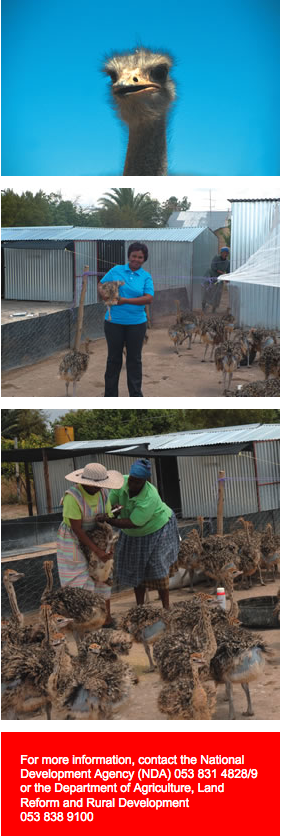 The well-known saying that some people hide their heads in the sand like an ostrich, refers to someone who refuses to face reality or recognize the truth (a reference to the belief that the ostrich hides from danger by burying its head in the sand). A group of women in the Northern Cape, who faced the stark reality of poverty, didn't bury their heads in the sand, but created some hope by starting an ostrich-farming co-op.
The well-known saying that some people hide their heads in the sand like an ostrich, refers to someone who refuses to face reality or recognize the truth (a reference to the belief that the ostrich hides from danger by burying its head in the sand). A group of women in the Northern Cape, who faced the stark reality of poverty, didn't bury their heads in the sand, but created some hope by starting an ostrich-farming co-op.
Although the land area of the Northern Cape is the largest of South Africa's nine provinces, it has the smallest population.
Large parts of the province are arid or semi desert with low rainfall. The main economic activities in the province are mining and farming. Farming consists mainly of livestock and some small-scale wine farms. Most of the people employed in the farming and mining sectors are men, which leaves many women unemployed. For many, their only income is through social grants like childsupport and old-age grants.
Reality
This was the stark reality faced by a group of women in the small farming town of Campbell outside Douglas about 100 kilometres from Kimberley. Ostrich farming is now providing them with hope for a better future.
Rather than living from hand-tomouth, the group of 15 women, including three youths, formed a co-operative called Basadi ba Kamoso (Setswana for 'Women of the Future') in November 2009.
With an amount of R700 000 funding from the National Development Agency (NDA), they started an ostrich farming project at Campbell where they lease one-and-half hectares of land.
Guidance and training
"We bought 100 ostrich chicks and started rearing them," said project leader Anna Theifane. They also bought fencing equipment, piping for water and animal feed. In addition, they built two enclosures for small ostrich chicks and bought an old caravan to use as an office.
The Northern Cape Department of Agriculture, Land Reform and Rural Development helps the allwomen co-operative with extension services such as ongoing guidance and training. The extension officer visits the ostrich farm three times a month.
Co-op members also received training in ostrich farming, business management, and financial management.
Profit
Once the ostriches weigh about 40 kilograms, they are sold to abattoirs in Kimberley. "We use the money from profits to buy extra ostrich chicks from a farmer in Douglas, as well as animal feed and medication," said Theifane.
The co-op members also get a monthly stipend from the profits made through the sale of ostriches, which helps them to support their families. "We chose ostrich farming because it is a unique project and there is no competitor," said Ogodiseng Lebatle, Department of Agriculture, Land Reform and Rural Development extension officer.
"Since the outbreak of disease in the ostrich farming areas of the Western Cape, most ostrich farmers have relocated to the Northern Cape and we see ostrich farming as our area of growth."
– Mbulelo Baloyi
Fun page Know your provinces ...
Fun page Know your provinces ... sadminGovernment's key priorities for 2011 Moving with speed to meet government's priorities
Government's key priorities for 2011 Moving with speed to meet government's priorities sadmin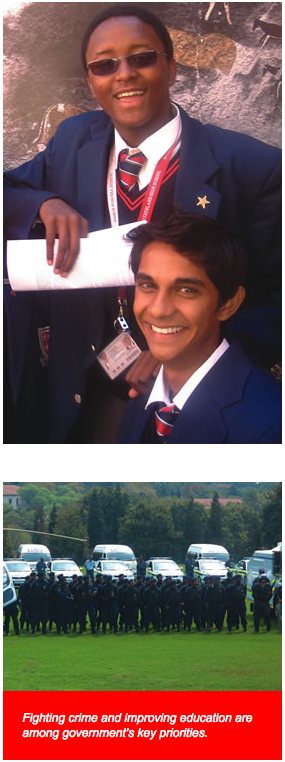 Government has committed itself to make a difference in the lives
Government has committed itself to make a difference in the lives
of people by addressing five key priority areas. They are education, fighting crime, health, employment and rural development.
Government is moving with speed to ensure that the aims of its five key priorities are met.
Plans are already in place to set up a National Health Insurance (NHI) by 2013. This will ensure that all South Africans, even those who are not on medical aid, will have access to affordable quality healthcare.
Rural Development
On rural development, government, through the Department of Rural Development and Land Reform, started the Comprehensive Rural Development Programme in provinces that were hardest hit by under-development.
This has seen government’s War on Poverty Programme being the central point of the Rural Development Programme.
It involves various other departments including Social Development, Agriculture and Water Affairs.
New Growth Plan
Late last year, the Department of Economic Development announced
its plan to create more than 50 000 jobs every year. The plan is known
as the New Growth Path (NGP).
Working with trade unions, government’s aim with this job-creation plan is to help reduce dependence on social security grants.
Fighting Crime
Government has recently strengthened its crime-fighting programmes
with more resources. These include equipment and vehicles, as well as more staff for the South African Police Force.
This month, Police Commissioner General, Bheki Cele, handed over more than 300 high-performance vehicles to the Gauteng police. This will ensure that a shortage of vehicles will not hamper crime fighting in the province.
Education
On the education front, the Department of Higher Education and
Training announced that government would begin fulfilling its promise of providing free education to poor students at institutions of higher learning. These include universities, universities of technology and colleges for Further Education and Training (FET).
As from this year, those students who qualify for assistance from the National Student Financial Aid Scheme (NSFAS) will receive funding to cover the cost of their studies.
All students who have NSFAS loans will have their loans changed into full bursaries if they complete their studies within the prescribed three-year duration period.
No fees
Another important development is that as from 2011, students in FET Colleges who qualify for financial aid will not be required to pay tuition
fees. This will make it even easier for students from poor families
to enrol at the FET colleges. This is aimed at helping the country to meet its needs for technical skills.
– Mbulelo Baloyi
Health Teenagers, sexuality and pregnancy
Health Teenagers, sexuality and pregnancy sadmin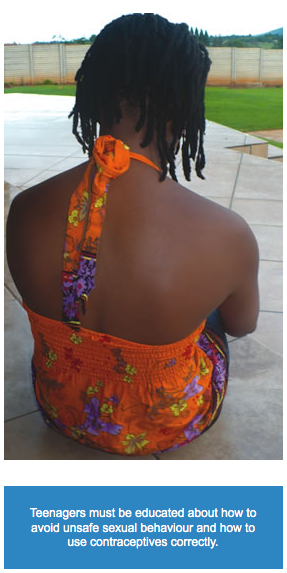 Most teenagers have a lot of questions about sex and sexuality and are unaware that their sexual development and behaviour have important health implications. Experimenting with sexual activity is a natural experience and often happens before a teenager is fully aware of how this might affect them. As teenagers grow and mature they are able to make better choices about relationships and it is strongly recommended that they don't rush into sexual activity too soon, but rather wait until they are more mature.
Most teenagers have a lot of questions about sex and sexuality and are unaware that their sexual development and behaviour have important health implications. Experimenting with sexual activity is a natural experience and often happens before a teenager is fully aware of how this might affect them. As teenagers grow and mature they are able to make better choices about relationships and it is strongly recommended that they don't rush into sexual activity too soon, but rather wait until they are more mature.
Teenage pregnancy
Teenagers should know that pregnancy is possible every time they have unprotected sexual intercourse, including the first time. Pregnancy in the teens can have serious health consequences for the mother and the baby. In South Africa it is reported that 66 out of every 1 000 pregnancies involve teenagers between the ages of 13 and 19. It is a known fact that teenagers are more likely to give birth to babies that are premature or sick. Pregnant teenagers usually drop out of school and many of them fail to complete their education. This leaves them with limited job opportunities which can result in poverty, increasing the burdens on themselves, their families and the community. Although some pregnant teenagers choose to have an abortion, this choice also carries risks.
Sexually transmitted infections (STIs) and HIV
Teenage sex exposes young girls to the risk of unwanted pregnancy, and it leaves youngsters vulnerable to contracting one or more of the many STIs, including HIV. The more sexual partners a teenager has and the younger they are when they indulge in sexual activity, the higher the risk of contracting an STI. Having one STI can make it easier to acquire other STIs at the same time. A person can have an STI without knowing it as there are often no noticeable signs or symptoms. All of the STIs can have serious consequences for future health. For example, a woman who gets an STI may have difficulty becoming pregnant later in life or may be more prone to developing certain types of cancer, such as cervical cancer. The use of condoms controls the spread of STIs.
Teenage pregnancy and HIV and AIDS
In South Africa the third-highest HIV infection rate occurs in young women between the ages of 15 and 25. Teenage pregnancy increases the risk of HIV infection and the virus is often passed on from the mother to the baby. This is called mother-to-child-transmission (MTCT). The Department of Health has made anti-retroviral drugs available to all pregnant women who test positive for HIV. These drugs have proved to be effective in preventing MTCT.
Teenagers and contraceptives
There are birth control methods (contraceptives) that can reduce the risk of pregnancy, but these do not reduce the risk of contracting an STI. The most successful method of protection against STIs is a condom. Contraceptive methods (other than abstinence) include pills, patches and injections. Healthcare providers will be able to give sexually active teenagers information and counselling on pregnancy and HIV transmission – this is called dual protection.
Sexual behaviour and health risks
-
 If a sex act is forced upon a person it is called rape. Rape is a very serious crime. Having sex with someone who is not sure they want to have sex can also be called rape.
If a sex act is forced upon a person it is called rape. Rape is a very serious crime. Having sex with someone who is not sure they want to have sex can also be called rape. - Teenagers sometimes get into difficult situations if they drink or use drugs and have sex. They may be lured into having sex and may be too drunk or high to know what they are doing. Later, the sex could be called rape.
- Teenagers may be lured into having sex with an adult. It is wrong for an adult to behave in this way, If an adult wants to engage in any type of sexual activity (kissing, petting, oral sex, intercourse) with a teenager or child, the teenager or child should report it to a parent, healthcare provider, law officer or other trusted adult at once.
Legal issues and pregnancy
Abortion (choice of termination of pregnancy) – Abortion, or choice of termination of pregnancy, means choosing to end the pregnancy, usually within the first three months (12 weeks) of pregnancy.
From the 13th week up to the 20th week of pregnancy there must be convincing reasons for terminating the pregnancy. These could include if the pregnancy resulted from rape o
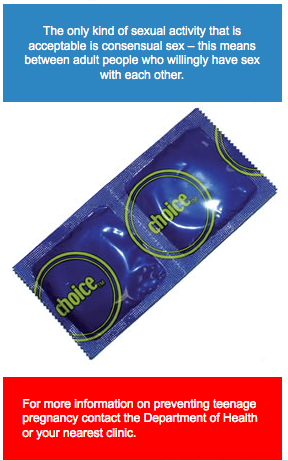
r incest; if the pregnancy poses a serious risk to the mother or the baby; or if the pregnancy would significantly affect the social and economic circumstances of the mother.
Termination of pregnancy may only be done by a medical practitioner or a registered midwife who has completed the prescribed training. No parental consent is needed from the age of 12 years.
Contraceptives – you are legally allowed to obtain contraceptives, even those that require a prescription, without parental consent.
Statutory rape – sex with a person under the age of 16 (heterosexuals and homosexuals) is called statutory rape and is punishable with a sentence of up to six years in prison, with or without a fine of up to R12 000.
HIV testing – anyone over the age of 12 years or older may request an HIV test. Children under the age of 12 need parental consent to take an HIV test.
Marriage – no parental consent to get married is needed after the age of 18.
Adoption – if a baby is given up for adoption, legal papers authorising the adoption need to be signed. No parental consent is needed, irrespective of age.
Hygenic living Hand-washing device promotes community health
Hygenic living Hand-washing device promotes community health sadmin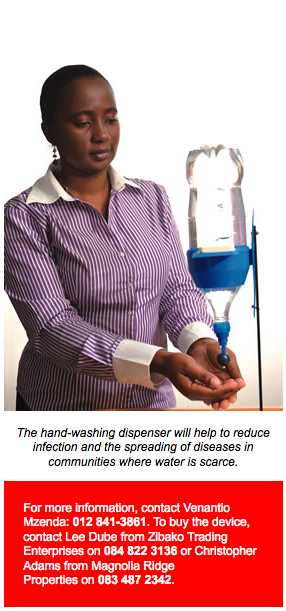 Every year, diarrhoea and infections cause the death of millions of
Every year, diarrhoea and infections cause the death of millions of
children under the age of five. Washing hands regularly with soap and water can prevent the spread of these dreaded diseases and cut the death rate by half. But many poor communities have limited access to clean water. An affordable hand-washing dispenser developed by the Council for Scientific and Industrial Research (CSIR) will go a long way towards helping such communities.
Many communities in South Africa’s deep rural areas have limited
access to clean water. The CSIR’s hand-washing dispenser helps such communities by providing households with a cheap, easy-to-use and hygienic way to wash their hands with soap.
So far, more than 110 000 units of this device have reached communities throughout the country, through municipality sanitation drives and non-governmental organisations in the water and sanitation sector.
Its target market also include schools, disaster areas, and large gatherings such as refugee camps.
How does it work?
All you need is an empty two-litre cool drink bottle. Fill it with clean water and screw the hand-washing dispenser onto the full bottle. The
dispenser releases enough water to enable hand washing with soap. It has a soap dish and hangs upside down on a bracket fastened to a
wall.
To get the water, place your hands under the device, which will lift up the plunger. When you lower your hands, the device seals itself. This stops water wastage and allows around 30 hand washes for every two litres of water.
Why is it safer than using a bucket?
Using a bucket of water for hand washing outside a toilet is unhygienic because many people use the same water. This promotes spreading of germs and diseases. An open bucket also attracts dirt, like dust, leaves, insects and other pollutants. In addition, animals may also drink from it and children may play with or drink it.
Who supplies the handwashing dispenser?
Two Pretoria-based companies have received licences to sell and
supply the dispenser to municipalities, contractors and non-governmental organisations.
Zibako Trading Enterprises will cover the Western Cape, Eastern Cape, North West and Free State provinces. Magnolia Ridge Properties will cover Gauteng, KwaZulu-Natal, Limpopo, Northern Cape and Mpumalanga.
– Samona Murugan
Ke Bona Lesedi Training Programme Freedom fighters for victims of CRIME
Ke Bona Lesedi Training Programme Freedom fighters for victims of CRIME sadmin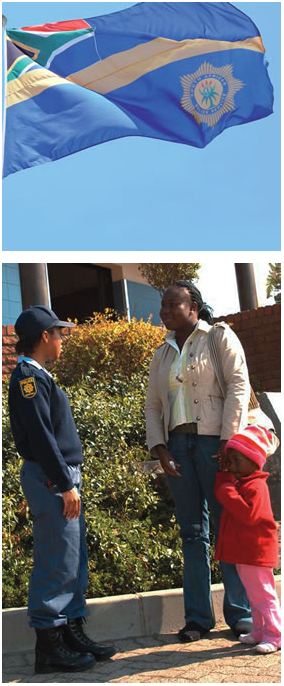 In support of government’s 16 Days of Activism campaign for No Violence Against Women and Children, 141 court preparation
In support of government’s 16 Days of Activism campaign for No Violence Against Women and Children, 141 court preparation
officers have successfully graduated from the Ke Bona Lesedi Training Programme. Court preparation officers who complete the training are referred to as “freedom fighters for victims of crime.”
Ke Bona Lesedi, which means, “I see the light” in Sesotho, is a training programme run and managed by the National Prosecuting Authority (NPA). The programme teaches court preparation officers (police officers responsible for preparing witnesses to testify in a court of law) the necessary skills to prepare such witnesses. The programme focuses mainly on women and children who had been victims of abuse.
Special training
Preparing witnesses and victims of crime to testify in court, makes a
huge difference in the criminal justice system, said Karen Tewson, the
programme’s national coordinator.
The idea of a training programme for court preparation officers came to Karen while she worked closely with the South African Police Service and with abused children. She realised that officers needed special training when dealing with people who had been victims of abuse, crime and trauma. According to Karen, there has been very littlesupport for such victims.
“They are usually extremely traumatised and have difficulty to testify effectively in court, especially young children”.
SAQA
After thorough evaluation, the NPA decided to adopt the programme as part of their responsibilities and procedures.
The role of an NPA-based court preparation officer has now been properly established and the training programme has been streamlined and brought in line with the South African Qualifications Authority’s (SAQA) requirements.
Ensuring justice
Thousands of cases are prosecuted every year and there are only about 2 000 prosecutors in the country. Court preparation officers are
therefore needed to provide a very important service alongside prosecutors. They address the needs, fears and concerns of victims and help them feel at ease.
By doing this, they play an important role in assisting the NPA to achieve its vision of ensuring justice in our society so that people can live in freedom and security.
Victims or witnesses of crime or abuse, can report incidents by telephone, in person at Community Service Centres, at police stations, or to members of the police patrolling in the community.
- Samona Murugan
012-845-6000
Keeping it brief
Keeping it brief sadmin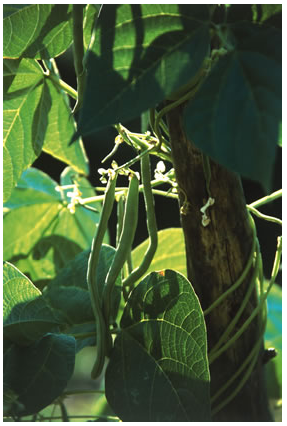 Reaching out to commercial farmers
Reaching out to commercial farmers
In an effort to create jobs and increase food production, the Department of Agriculture, Fisheries and Forestry will soon be launching a call centre where people with an interest in becoming commercial farmers can get useful information, including how to access finance. This announcement by Agriculture, Fisheries and Forestry Minister, Tina-Joemat Pettersson, is in line with government's goal to create 300 000 jobs on smallholding farms. Government aims to increase the number of smallholding farmers and black commercial farmers in the next five years to help ensure that more food will be produced to meet the country's growing food security needs.
The Minister emphasised the importance of subsistence farming in the country and urged people to go back to their own backyards, as well as the backyards of their schools and hospitals to grow food crops. She said each family should have a vegetable garden and grow their own food.
– BuaNews
For more information, call the Department of Agriculture, Fisheries and Forestry: 012 319 6000 Fax: 012 319 0000
Gauteng
The Department of Social Development has taken a school for children with disabilities north of Pretoria, under its wing to ensure learners receive the best education government can offer. During a visit to the Filadelfia Secondary School in Soshanguve, Deputy Minister for Social Development, Maria Ntuli said learners with disabilities should have equal access to opportunities such as bursary schemes and institutions of higher learning. – BuaNews
Northern Cape
Floods have left many parts of the Northern Cape disaster areas since the beginning of December. More than 24 000 farmers around Upington, Kakamas and Keimoes were without work due to loss of production as a result of the overflow of the Orange River. Developing farmers are the worst victims of the floods, and as a result, some are unable to continue repaying loans to the banks, such as the Land Bank and other financial institutions that support farmers. – BuaNews
North West
By 14 November last year, more than 400 000 people in the province had been tested for HIV since the launch of the HIV Counselling and Testing (HCT) campaign in April. At least 405 650 people were screened for TB. A total of 72 279 people tested HIV positive, with 42 262 being referred for treatment. The province aims to test one million people out of its population of at least 3.2 million by the end of the campaign in June this year. – BuaNews
Mpumalanga
In a bid to reduce the rate of new HIV infections, Health Minister Dr Aaron Motsoaledi has committed to perform 1 000 male circumcisions in Mpumalanga by 2015. Mpumalanga has the second highest HIV prevalence rate after KwaZulu-Natal. To facilitate these actions, government has started a series of community dialogues, which aim to engage people in their communities to better understand their needs and challenges around HIV and AIDS. – BuaNews
KwaZulu-Natal
There is an urgent need to significantly reduce the rate of teenage pregnancy, said KZN MEC for Health, Dr Sibongiseni Dhlomo. Dhlomo, who visited New Year babies and their mothers early in the year, advised the teenage mothers he met to educate their peers about the difficulties of delivering a baby and being pregnant at such a young age. – BuaNews
Eastern Cape
Government and fuel company Sasol launched an R8 million Integrated Energy Centre (IEC) at Qunu in January. The centre will provide products such as aluminium, paraffin, diesel, petrol and gas-burner stoves.The IEC also offers services such as a library, an information centre and a community room for the benefit of the community. The project has created at least 50 short-term job opportunities while more than 10 permanent employment opportunities are foreseen. – BuaNews
For more information, call 1020
Letters to the Editor Give us a piece of your mind
Letters to the Editor Give us a piece of your mind sadmin Winning letter
Winning letter
To the class of 2010 – we are all achievers!
As a fellow matriculant, I would like to dedicate this letter to all the 2010 matriculants. We prepared for our matric year from the minute we learned to read and write and suddenly those scary exams were just around the corner! Let us not forget that there is no failure in not doing well, but there is failure in not having tried. The year 2010 was full of distractions for us, but we learnt to toughen up a bit. We had been running the race together until the time arrived to reach the finishing line.
We don't want to be remembered for our good results, but for the race we ran in 2010 – it's not about winning the race, but about how we ran the race. For those who didn't make the grade, just remember that you are not a loser – we are all achievers for having reached matric. For that let us be our own cheerleaders even if we feel the world has neglected us!
- Archibald Rooi , Klerksdorp, Gauteng
Lead by example
Mothers and fathers should lead their children by example. Children look up to them and often follow in their footsteps. Therefore parents should display positive, good and motivational behaviour and set the right example. By being good examples, parents can help combat problems like crime, domestic violence and abuse. No one is born a thief, an abuser, a highjacker or a doctor. Like father like son, an abusive man or a drinking father can transfer his bad habits to his young sons. So, I beg the readers of Vuk'uzenzele to lead by example.
– Z.D. Ndlovu, Ebusi Village, KwaZulu-Natalt
Take responsibility
The failure rate at schools keep on increasing and when students and learners are asked why they fail, they say that teachers are not doing their jobs, while knowing that they are not doing their own duty by studying at home. They don't want to focus on their school work at home for just 30 minutes a day, but when it comes to entertainment and relationships, 30 minutes a day is not enough.
Blaming teachers for failure and not taking responsibility for their own bad performance leads to more learners not matriculating. Be careful of the impact of things that you spend most of your time doing, whether they are positive or negative.
– Khamadi Joseph, Allanridge, Free State
Don't live to regret
American R&B singer, Mary J Blige, once said that education was the bridge to life. It is very true, but we, the youth of today, don't always realise this until we reach the stage when we have to stand up for ourselves. Some of us don't finish matric and end up having no option in life, only regrets and blame. I'm an example of this. I played at school, disrespecting my teachers and forgetting that my own future was the one I was playing with, not my teachers'. It is said that whatever you do will affect you for the rest of your life. Don't forget this, so you won't live with regrets.
– Phahlane Gadifele, Ga-Rakgoadi, Limpopo
Change bad habits
Habits uncorrected are habits repeated and habits repeated are results repeated. You cannot expect different results if you don't change the way of doing things – it would be insane. If you keep on doing the same thing in the same way all the time, you will keep on producing the same results all the time. If you want to change the results you must change the habits.
– Samuel Radebe, Heilbron, Free State
Too many teen pregnancies
My heart is torn apart when I see the high rate of pregnancies in our schools. Beautiful young girls are dating much older men who are supposed to be like fathers to them. Girls are only dating them because they offer greater financial security than boys. But instead of protecting them, they infect them with diseases and cause unwanted pregnancies. This increases the already high level of school drop-outs and contributes to the many abortions that are taking place!
– Mokhabuki Godwin, Tzaneen, Limpopo
Your letter is relevant to the issues discussed in our health feature.
– Editor
Set realistic goals
During the first few months of the new year we often make new year's resolutions. Making plans to improve your life is a great thing to do, but it's pretty useless if you don't see them through. It's no use setting goals that are impossible to achieve, like being the boss of your company while you're still in a junior position now. Make realistic goals, be clear about what you want to achieve and believe that you can do it.
– Rebecca Kanyane Letshedi, Ga-Marishane, Limpopo
Farmers do a great job
I would like to encourage and convey my compliments to the people who are working on the farms. Those people are doing a great job. They are the pillar of the nation. Some have gained many years of experience on farms. But unfortunately they often think they will be better off if they leave farms and move to Johannesburg to work on the mines. People must stop thinking about Johannesburg or mines. We should rather shift our mindsets to make things happen for ourselves – Vuk'uzenzele!
–Zoyisile Nicholas Mavumengwana, Sandhills, Western Cape
See main feature on page 30.
– Editor
The best thing ever
Vuk'uzenzele is the best thing ever and I feel it has to be praised. It has changed our lives and has made us proud to be South Africans! You have helped many jobless people to put bread on the table by introducing the opportunities that government offers. It has made it possible for boys and girls to further their studies by introducing bursary and loan schemes; small businessmen are happy to see their businesses grow because the magazine introduced agenices that provide training. You are a mother to the nation. Keep on doing a good job.
-Johann Mathiane, Ga-Mushi Village, Limpopo writer
WRITE TO:
Vuk'uzenzele, Private Bag X745, Pretoria, 0001, or e-mail: vukuzenzele@gcis.gov.za.
If you don't want to have your real name published, you may use a different name, but you must include your real name and address to us.
PLEASE NOTE:
To win a prize, you must include a physical address and a contact telephone number in letters to us.
All letters will get a response.
Municipal Elections 2011 Exercise your RIGHT to VOTE
Municipal Elections 2011 Exercise your RIGHT to VOTE sadmin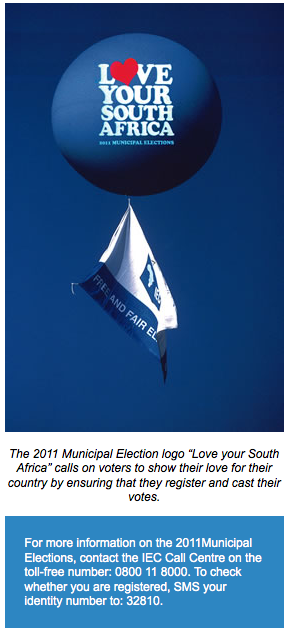 Preparations for the 2011 Municipal Elections started when the Municipal Demarcation Board (MDB) submitted the country’s new wards to the IEC on 1 September 2010.
Preparations for the 2011 Municipal Elections started when the Municipal Demarcation Board (MDB) submitted the country’s new wards to the IEC on 1 September 2010.
The MDB is a legal body responsible for making municipal boundaries. In addition, it also establishes new wards and voting districts.
Mass participation
The IEC’s campaign is aimed at promoting mass participation of all people who are eligible to vote in the 2011 Municipal Elections. The campaign will also help with voter information such as the location
of voting stations throughout the country.
Voting districts
The 2011 municipal elections will take place in eight metropolitan councils, 226 local councils, 44 district councils and 4 277 wards.
The IEC has established 20 868 voting districts for this purpose, with 633 of the voting districts serving as voting centres and dedicated to servicing voting districts with many people.
All the 20 868 voting districts had their stations opened for registration during the weekend of 5 and 6 February 2011, which was a voter registration weekend. Another voter registration weekend will be held before the elections.
Just over 60 000 registration officials were trained for the voter registration weekend. The commission will also appoint 196 000 election officials for election day.
A sense of belonging
The campaign, with its slogan “Love Your South Africa”, aims to encourage a sense of belonging. It makes a call to all eligible voters to respond to their love for their country by ensuring that they register and vote in these elections.
The IEC has also activated its toll-free Call Centre number 0800 11 8000. The toll-free number has been operational since 3 January 2011 and is open from 8 o’clock in the morning to 5 o’clock in the afternoon. Voters can call in to ask any questions relating to registration and voting procedures.
SMS facility
Voters can also use their cell phones to check their registration details through an SMS facility. This facility is user-friendly and is available
on three networks, namely Vodacom, MTN and Cell C.
All you have to do to check your registration details is to type in your identity number and send it to 32810 from any of the three networks. In return, you will receive confirmation of your registration details.
– Mbulelo Baloyi and IEC
New forms of companies under the New Companies Act
New forms of companies under the New Companies Act sadmin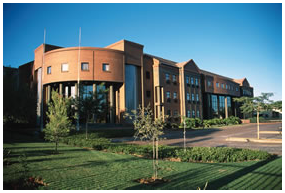 The new Companies Act (Act 71 of 2008) will be implemented on 1 April 2011, replacing the current Companies Act (Act 61 of 1973). The Companies and Intellectual Property Commission will be the implementing agent of the new Act and will replace the Companies and Intellectual Property Registration Office (CIPRO).
The new Companies Act (Act 71 of 2008) will be implemented on 1 April 2011, replacing the current Companies Act (Act 61 of 1973). The Companies and Intellectual Property Commission will be the implementing agent of the new Act and will replace the Companies and Intellectual Property Registration Office (CIPRO).
The new Act provides for two categories of companies:
A business plan is a written document that gives details about your business idea and how you plan to run your business. It is like a plan of action that gives step-by-step information about your business and why you think it will work.
Non-profit companies (NPC) are categorised by the following main characteristics:
- Incorporated for "public benefit purpose";
- Income and property not distributable to incorporators, members, directors, officers; (except reasonable compensation for services rendered);
- Incorporators (three persons), 3 directors;
- Apply all of its assets and income to advance its stated objects, as set out in its Memorandum of Incorporation;
- A varied application of the Act, as set out in Section 10; and
- A special set of fundamental rules, set out in Schedule 1, retaining the current principles concerning the objects of such companies, and restricting the distribution of any residual assets on dissolution, in addition to other matters unique to non-profit companies.
For profit companies are recog-nised as being one of the following types:
- Private companies, which are comparable to companies of the same status under the old Companies Act;
- Personal liability companies, which are comparable to companies contemplated in Section 53 (b) of the old Companies Act;
- Public companies, which are comparable to companies of the same status under the old Companies Act; and
- State-owned companies, which were often incorporated or registered under the old Companies Act, but were not recognised in that Act as requiring separate legislative treatment in respect to certain matters to avoid conflict or overlap with other legislation specifically applicable to them, and not to companies.
Close corporations
The new Act provides for the indefinite existence of the Close Corporations Act, but provides for the closing of that Act as an avenue for further incorporation of new Close Corporations. Close corporations on the register as of the effective date of the new Companies Act will continue to exist until such time as their members decide that it is in their interest to convert to a company.
So, no new close corporations will be registered once the new Companies Act comes into operation on 1 April 2011. Close corporations will automatically fall under private companies and the Close Corporations Act will be amended to provide for parity with private companies.
Operation Khanyisa STOP electricity theft – the POWER is in YOUR HANDS
Operation Khanyisa STOP electricity theft – the POWER is in YOUR HANDS sadmin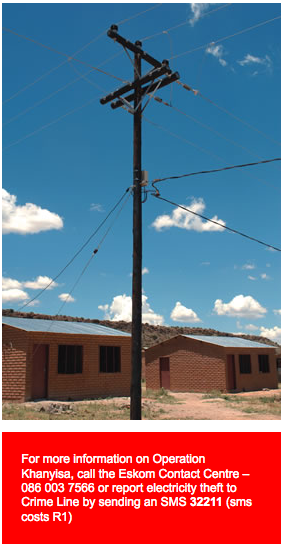 Electricity theft is costing the country more than R4,4 billion per year. All South Africans are therefore urged to work together to stop electricity theft. Operation Khanyisa is an opportunity to do this. It is time to do the right thing - the power is in your hands.
Electricity theft is costing the country more than R4,4 billion per year. All South Africans are therefore urged to work together to stop electricity theft. Operation Khanyisa is an opportunity to do this. It is time to do the right thing - the power is in your hands.
The electricity-saving campaign known as Operation Khanyisa (isiZulu for “enlighten” or “light up”) has the support of Business Against Crime of South Africa (BACSA), Business Unity South Africa (BUSA), Primedia Crime Line, Proudly South African and the South African Local Government Association (SALGA).
Illegal connections
Sloppy illegal electrical connections is a familiar sight throughout
South Africa’s towns, cities and rural areas. Poor people are usually
blamed for electricity theft, but shocking findings show that businesses and agriculture are also involved in this crime.
Electricity theft causes overloading of the network, which finally leads to power cuts. This leads to things like loss of productivity and traffic jams.
Use, don’t abuse!
With its slogan – Use, Don’t Abuse– Operation Khanyisa urges every
South African to help stop the abuse of electricity. Electricity theft is costing the country more than R4,4 billion per year. About 60 per cent of this amount is theft committed by business, commerce and agriculture. The remaining 40 per cent is theft committed by residents
through illegal connections.
Non-residential electricity thieves include owners and operators of major industries who use methods that bypass electricity meters.
Through Operation Khanyisa, Eskom focuses on employees in the electricity industry, electrical contractors and municipalities urging them to stop getting involved in criminal activities through stealing electricity.
Tougher punishment
Eskom Chief Executive Officer, Brian Dames, said Eskom has asked the Justice Department and the National Prosecuting Authority to change the law to make electricity theft a form of sabotage.
This will lead to tougher punishment for electricity thieves.“Electricity theft and the theft of copper cables often cause major disruption in as far as power supply is concerned,” said Dames.“This causes serious disruption to transport and telecommunications across the country,” he said.
Crime Line
The aim of Operation Khanyisa is to mobilise South Africans to prevent and not to participate in any form of activity related to electricity
theft.
Eskom hopes that partnering with Primedia’s Crime Line will go a long way in preventing electricity theft. Crime Line has had notable
successes with members of the public reporting crime using the SMS
service, 3221.
– Mbulelo Baloyi
Rize Mzansi successes Aluminium was his window of opportunity
Rize Mzansi successes Aluminium was his window of opportunity sadmin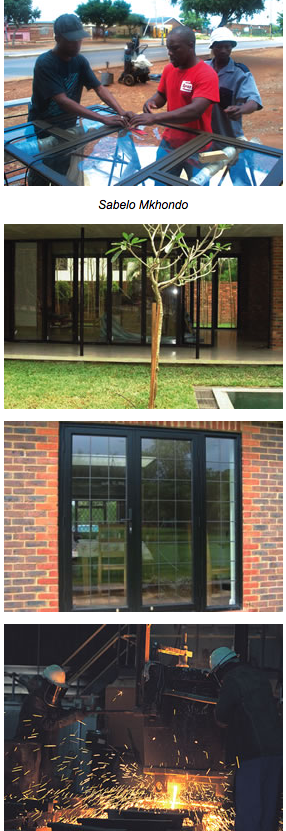 Last year’s first FIFA World Cup brings fond memories for Sabelo Mkhondo. This 30- year old entrepreneur from Katlehong, saw the window of opportunity and benefited from South Africa’s hosting
Last year’s first FIFA World Cup brings fond memories for Sabelo Mkhondo. This 30- year old entrepreneur from Katlehong, saw the window of opportunity and benefited from South Africa’s hosting
the football showpiece. He started an aluminium business and got a tender to do work for SAFA.
After featuring on the Rize Mzansi TV programme, Sabelo Mkhondo’s
phone never stopped ringing. “Many people saw my work and they were very impressed – I have been busy since then. I hope to expand to bigger premises to handle big orders as well,” said Mkhondo, who is the proud owner of Mamelodi Aluminium Spazal.
“Despite only three years in business, my company got exposure that
I could only dream of,“ he said.
Business skills
Spazal is a programme supported by Wispeco Aluminium (manufacturers of window frames and shower doors) and the Manufacturing, Engineering and Related Services SETA(MERSETA).
The Wispeco Institute, with the support of MERSETA, presents formal
business learnership programmes to young unemployed people from
previously disadvantaged communities in Gauteng, Limpopo and the
Western Cape.
The learnership equips entrepreneurs with skills to start and manage their own businesses. In addition, Wispeco also introduces high-quality technical training on the various Wispeco products. The practical training is done in workshops where the entrepreneurs
learn to make their own aluminium windows, doors, garage doors and showers.
Own company
Thanks to training given by both Wispeco and MERSETA, Mkhondo
was able to start his own window frames company called Mamelodi
Aluminium in 2007. Apart from making frames for doors and windows,
Mkhondo also manufactures shop fronts.
SAFA House
The highlight of this exposure was when I got a tender to do work at the South African Football Association (SAFA) House which was the FIFA headquarters during the 2010 FIFA World Cup,” said Sabelo
Mkhondo also did some work at the FNB Stadium, the venue of the opening and closing matches of the 2010 World Cup.
“The impressive work I did at SAFA House and FNB Stadium also resulted in many people wanting me to do work for their companies, as well as their homes.”
Job creation
Mkhondo’s business also created five permanent jobs at his workshop in Pretoria. He chose Pretoria because at the time there were few up-and-coming manufacturers of aluminium window and shower door frames in the area. Mkhondo’s business was also featured in the Rize Mzansi reality television show between September
and October last year. Government funded the Rize Mzansi show with
the main objective of highlighting economic programmes that were offered by different government departments.
training project, call 0861 637 738, or contact
MERSETA: Tel: 011 551-5202; Fax: 0866 730017
- Mbulelo Baloyi
Rize Mzansi successes Boosting business in tourism and hospitality
Rize Mzansi successes Boosting business in tourism and hospitality sadmin Hardly a year after the co-owner of a guesthouse in Rosebank,
Hardly a year after the co-owner of a guesthouse in Rosebank,
Gauteng, registered with the Tourism Enterprise Partnership
(TEP), the business has seen remarkable growth. TEP is a
programme of the Department of Tourism that aims to help upand-
coming entrepreneurs in the tourism and hospitality sectors.
The Rosebank-based Lilogo Lodge registered with the TEP programme in October 2009. Lodge manager, Chimene Chetty, says she was new in the tourism sector and needed someone to guide
and mentor her in her young business.
"I needed support and mentoring to get information and understanding of the sector and its challenges. It is very isolating for entrepreneurs entering a new space for the first time," said Chetty. She asked for help from the Department of Tourism and they referred her to TEP, which has helped her business to grow.
Training
Chetty got training in different aspects of the business. These included marketing and business management, finance, and human
resources.
The lodge started with one permanent staff member and one temporary staff member. It had a monthly income of about R9 000. It now employs five permanent and two temporary staff members with a monthly income of about R50 000. Lilogo Lodge is 100 percent owned by black women and they employ mostly women. Chetty says she also supports small businesses and most of her suppliers are small business owners.
Environment friendly
Environment friendly Lilogo Lodge is environmentally friendly through careful management of lighting, heating, maintenance, supplies, and waste. The lodge also uses low-flow showerheads in its bathrooms to save water.
In addition, the lodge is involved with greening activities in areas such as Alexandra Township where it has formed a partnership with locals to build a community nursery.
Warm hospitality
Chetty aims to ensure that guests have a home-away-from-home experience at the lodge, promising warm hospitality and a comfortable stay. “I try to create a comfortable, enjoyable and safe experience for visitors,” she said.
Rize Mzansi
Lilogo Lodge was featured in the government-funded television
reality show, Rize Mzansi, as an example of how government programmes help SMMEs to grow their businesses. The TV reality
show was broadcast on SABC1 between September and October 2010.
-Mbulelo Baloyi
"Being featured on Rize Mzansi certainly helped to expose my business to a wider audience and potential market. The partnership has also helped me to keep in touch with developments in the sector and with our grading process with the Tourism Grading Council of South Africa."
– Chimene Chetty
Role model A gifted farmer who gives to others
Role model A gifted farmer who gives to others sadmin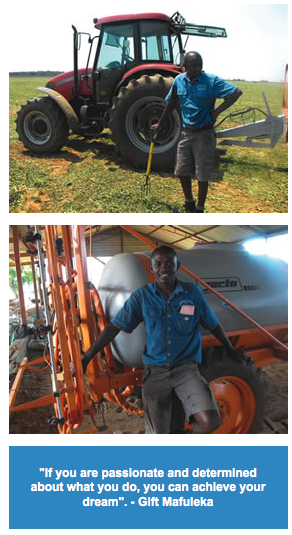 Making a difference in his community through his passion for farming has been a life-long dream for Gift Mafuleka of Bronkhorstspruit. Gift, who is only 29 years old, is a young commercial farmer who is successfully managing a 342-hectares farm. He employs 11 women from the community and serves as an inspiration to other young people who dream of making a success of farming.
Making a difference in his community through his passion for farming has been a life-long dream for Gift Mafuleka of Bronkhorstspruit. Gift, who is only 29 years old, is a young commercial farmer who is successfully managing a 342-hectares farm. He employs 11 women from the community and serves as an inspiration to other young people who dream of making a success of farming.
A huge billboard, which reads Mphiwe Siyalima, welcomes visitors to Gift Mafuleka's farm near Bronkhorstspruit. Loosely translated this means "Using our given talents, we are farming together".
Gift believes there is a need for more young people from historically disadvantaged communities to get involved in the agricultural community. He employs 11 women from the community.
New Life
Gift, who received a five-year lease from the Department of Rural Development and Land Reform for a portion of the Leeuwfontein farm in the Metsweding District, is breathing new life into the agricultural community. This is an industry which many young people regard as reserved for the older generation.
The farm, which covers an area of about 342 hectares, can support about 60 hectares of irrigation, 70 hectares of arable land (land that can be used for ploughing and planting crops) and seven hectares of extensive vegetable land.
BTech degree
Gift was born in Esikhawini, Richards Bay in KwaZulu-Natal and says his love for farming grew from helping his grandfather who was a subsistence farmer in the area. This led him to obtain his BTech degree in crop production.
After graduating from King Bhekuzulu College in Nongoma, Gift joined McCain Foods South Africa as a crop manager based at the Leeuwfontein farm.
Productive use
Gift was determined to become a farmer. So, with his mentor, Tim Hedges, a former colleague at Mc- Cain, he approached the Department of Rural Development and Land Reform. The land belonged to McCain at the time. Government acquired the farm as part of its Proactive Land Acquisition Strategy (PLAS), which aims to speed up the land redistribution process and ensure maximum productive use of the land.
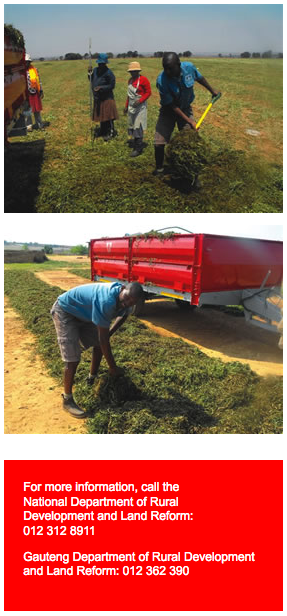 Passion
Passion
Irrigation equipment has been installed at the farm as part of the agreement with McCain Foods. McCain also bought farming equipment valued at R450 000 for the project.
Gift will be planting peas in winter and sweet corn in summer. The equipment will be paid off through the income generated by the delivery of peas and sweet corn to McCain over the five years. The department has furthermore approved funding of over R1 million to be used to cover key production expenses.
Gift believes if you are passionate and determined about what you do, you can achieve your dream.
– Samona Murugan and BuaNews
TB Awareness Month Transforming the fight againstTB
TB Awareness Month Transforming the fight againstTB sadmin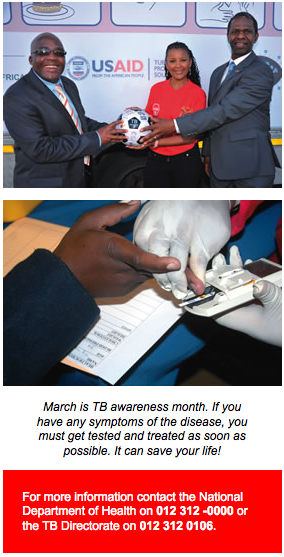 Tuberculosis (TB) causes thousands of deaths every year in South Africa and the rest of the world. To help stop the spread of the disease, the World Health Organisation (WHO) started a new plan called the Global Plan to Stop TB 2011-2015: Transforming the Fight - Towards the Elimination of Tuberculosis.
Tuberculosis (TB) causes thousands of deaths every year in South Africa and the rest of the world. To help stop the spread of the disease, the World Health Organisation (WHO) started a new plan called the Global Plan to Stop TB 2011-2015: Transforming the Fight - Towards the Elimination of Tuberculosis.
The number of people who die from TB rises worldwide every year. The new and improved plan is action oriented. It will run from 2011 to 2015 and its main aim is to save more than five million lives in the next five years.
The plan will improve TB research to help the development of rapid TB tests, faster treatment plans and more effective vaccines.
TB ambassador
South Africa has one of the highest TB rates in the world. Government has therefore accepted the responsibility of increasing the fight against TB, as well as HIV and Aids.
South African TV personality Gerry Elsdon is an ambassador for the TB campaign, as well as an advocate for the International Federation of the Red Cross and Red Crescent. Gerry was diagnosed with tuberculosis of the womb nine years ago and fights for the rights of people affected by the disease.
Finding out she had TB prompted Gerry to learn more about the disease. She learnt that it is a curable disease and that treatment is available free of charge at all public health facilities. She then decided to educate others about what can be done to fight TB.
HIV and Aids
Research has shown that thousands of TB cases become almost five times more severe than it should be due to HIV and Aids. Antiretrovirals (ARVs) do not cure TB and TB drugs don’t cure HIV. This is why it is very important that people should know their HIV status and to get tested for TB and HIV regularly.
- Samona Murugan
STOP TB - BECAUSE I CAN!
The Department of Health, through their Khomanani TB programme encourages all South African’s to join in the united pledge to stop TB. TB is preventable and curable, yet
our people still die from this disease. To fight TB, all South Africans should stand together and pledge that:
- I will go for an examination if I cough for longer than two weeks
- I will advise anyone who coughs for more than two weeks to go for an examination
- I will take my treatment until the end if I am diagnosed with TB
- I will help TB patients take their medication everyday
- I will ensure that my actions do not affect TB patients negatively.
Youth Act against abuse in schools
Youth Act against abuse in schools sadmin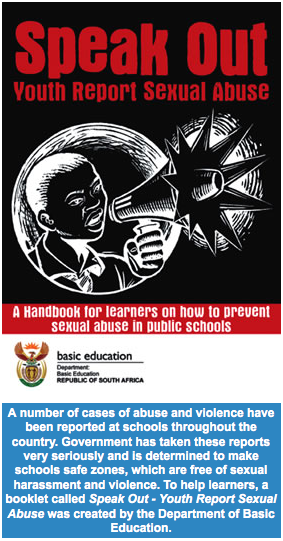 Sexual harassment and violence in schools prevent learners from enjoying their right to equality and dignity. Learners who are victims of sexual violence, sexual harassment and abuse are seriously affected. Their self-esteem and confidence drop, they become emotionally withdrawn, do not attend some classes or stay away from school, which affect their grades.
Sexual harassment and violence in schools prevent learners from enjoying their right to equality and dignity. Learners who are victims of sexual violence, sexual harassment and abuse are seriously affected. Their self-esteem and confidence drop, they become emotionally withdrawn, do not attend some classes or stay away from school, which affect their grades.
Communities must stand together and act against abuse. Report and stop abuse!
The opening and closing ceremonies of the festival will be held on 13 and 21 December respectively at Orlando Stadium in Soweto.
Code of Conduct
In 2008, the Department of Education issued Guidelines for the Prevention and Management of Sexual Violence and Harassment. The aim was to help schools and communities to deal with cases of sexual harassment and sexual violence against learners.
Every school also developed a Code of Conduct, which is a set of rules explaining what is acceptable and unacceptable behaviour. All teachers and learners are expected to sign the Code of Conduct and commit themselves to respect the rules. If a teacher is caught behaving in an unacceptable manner, he or she will be charged with misconduct.
Speak out
Unfortunately sexual abuse is often not reported due to fear and victimisation. Many young people and their parents are afraid to report teachers and other community members, because they fear the negative reaction or ridicule they may face. Government's handbook for learners Speak Out - Youth Report Sexual Abuse, aims to inform and empower learners through knowledge to recognise and act against sexual harassment and sexual violence. It shows learners how to protect themselves from abusers and where to get help. The handbook also provides contact details of national and provincial organisations that can help.
Legacy
As the host country for this event, it will also be an opportunity for South Africa to build on the spirit and legacy of the 2010 FIFA World Cup. It is a chance to continue to show the world that we are great hosts. It will promote our country as a tourist destination and continue to raise awareness internationally.
- Samona Murugan
Beware of unregistered colleges
Many matriculants are looking for tertiary institutions where they can further their studies. Those who were not accepted at universities, universities of technology or Further Education and Training (FET) colleges, often turn to private institutions.
Because of peer pressure to study at a tertiary institution, some students wil enrol at any college that will accept them. But they often overlook basic important information before registering, like whether the institution is registered with the Department of Higher Education and Training.
Unsuspecting students often only realise
halfway through the year that the institutions they are registered with are not legally registered with the department. This comes at a huge cost of wasted money and time, as the qualifications offered by these unregistered colleges will not be recognised.
To prevent would-be students from falling into the trap of enrolling at unregistered colleges, the department offers guidelines about what to look for before they register.
The Department of Higher Education and Training publishes the Register of Private Further Education and Training Colleges on its website. The Register lists colleges that are provisionally registered.
The public, parents and students are advised to check the registration status of private FET colleges in the Register of private FET colleges on the Department's website.
The website address is: www.education.gov.za.
– Mbulelo Baloyi
For more information on the registration status of private FET colleges, contact the Department of Higher Education and Training: 012 312 5878 or 0800 734 338.
